Papers by Alessandro Salice
Husserl Studies, 2024
In a recent series of important papers, Søren Overgaard has defended a disjunctivist reading of E... more In a recent series of important papers, Søren Overgaard has defended a disjunctivist reading of Edmund Husserl’s theory of perception. According to Overgaard, Husserl commits to disjunctivism when arguing that hallucination intrinsically differs from perception because only experiences of the latter kind carry singular content and, thereby, pick out individuals. This paper rejects that interpretation by invoking the theory of intentionality developed by Husserl in the Logical Investigations. It is claimed that this theory not only lacks the notion of singular content, but it also entails the idea that perceptions and hallucinations belong to the same kind of experience. If that is correct, a commitment to conjuctivism on Husserl’s end follows, pace Overgaard.
The paper compares the two remarkably similar and yet strikingly different theories of promises d... more The paper compares the two remarkably similar and yet strikingly different theories of promises developed by Adolf Reinach and Margaret Gilbert. Margaret Gilbert claims that promises can be explained in terms of joint commitments borne by the promisor and the promisee to the decision that the promisor will φ. On this view, the promisor's obligation and the promisee's claim are grounded in the commitment they have jointly entered. By contrast, Adolf Reinach submits that promises do not have substantial explanation and that they generate promissory obligation and claim in virtue of their nature. By using insights from Reinach's theory, this paper argues that Gilbert's account of promises is to be rejected and suggests abandoning the idea that progress in our understanding of promises requires submitting them to substantial explanations.
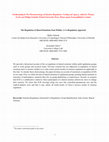
We provide a theoretical account of the co-regulation of shared emotions within small egalitarian... more We provide a theoretical account of the co-regulation of shared emotions within small egalitarian groups such as work groups and research teams. Previous research has not addressed co-regulation of shared emotions and it is unclear whether or to what extent current models of emotion regulation are applicable in this task. To remedy these shortcomings, the paper develops an account of emotional co-regulation (ECR) in two steps. First, we refine the idea of shared emotions in egalitarian groups, positing shared emotions as structures of participatory emotions that rely on group-identifying co-experiencers. Second, we propose that ECR is a collaborative endeavor where participants of a shared emotion collectively strive to change their emotion. We show that ECR develops along two axes (the controlled-spontaneous axis and the explicit-implicit axis) and that it may utilize all nodal points of Gross’s process model of emotion regulation.
Philosophical Psychology, 2023
An important thesis discussed in the literature on shared agency is that group identification mot... more An important thesis discussed in the literature on shared agency is that group identification motivates pre-school children to act together. This paper aims at further illuminating this thesis by clarifying what triggers the process of group identification in young children. It is argued that joint attention, among other functions in supporting joint actions, can reveal to the co-attenders that they share some preferences. Since sharing preferences has been established by the literature to be a reliable motivation of group identification and since joint attention has an early emergence in development, one can consider joint attention to be a putative trigger of group identification in pre-school children. If this is on the right track, group identification, joint attention, and preferences identify a cluster of minimal pre-conditions for joint actions.
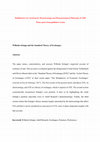
New Yearbook for Phenomenology and Phenomenological Philosophy , 2022
The paper mines, contextualizes, and assesses Wilhelm Schapp’s neglected account of contracts of ... more The paper mines, contextualizes, and assesses Wilhelm Schapp’s neglected account of contracts of sale. This account is evaluated against the background of what Emma Tieffenbach and Olivier Massin label as the “Standard Theory of Exchanges [STE]” and the “Action Theory of Exchanges [ATE]” in their recent paper “The Metaphysics of Economic Exchanges” (Journal of Social Ontology, 2017). The first section of the present article introduces STE, its shortcomings, and ATE as a theory of exchanges, which is superior to STE. The second section systematically reconstructs Schapp’s own position. It does so by highlighting the credit Schapp’s position especially owes to Adolf Reinach’s phenomenology. Finally, the third section claims that Schapp’s theory remains largely untouched by the shortcomings that affect STE and that it can be considered as a precursor of ATE, since it shares important insights with that account.
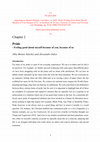
Emotions in Culture and Everyday Life Conceptual, Theoretical and Empirical Explorations, edited by Michael Hviid Jacobsen, 2022
Pride is generally portrayed as an emotion of self-appraisal or as a self-conscious emotion. When... more Pride is generally portrayed as an emotion of self-appraisal or as a self-conscious emotion. When feeling pride, one evaluates (and therefore is intentionally directed towards) oneself as commendable in light either of one’s achievements (agential pride) or one’s identity or character traits (non-agential pride). This account adequately captures a large number of emotional episodes, but it notably leaves aside the social dimensions of pride. This chapter offers a view of pride as social in two senses. First, in its more minimal understanding, pride is a social emotion insofar as it reveals that a dimension of ourselves is exposable to and depends on others. Second, in a more specific sense, some instances of pride can be ‘hetero-induced’. Hetero-induced pride is pride that is elicited by significant others, and more specifically, by those others whom we perceive as members of the same group to which we also belong. The aim of this chapter is to map the terrain of current research about pride while putting particular attention on the way in which sociality impacts pride.
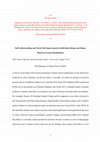
The Moral Psychology of Shame, edited by Alessandra Fussi and Raffaele Rodogno, 2023
Shame presents us with a dilemma. On the one hand, this emotion has traditionally been accorded a... more Shame presents us with a dilemma. On the one hand, this emotion has traditionally been accorded an important role in moral learning and self-reformation, as an unpleasant emotion that makes us feel bad about our flaws and motivates us to try to mend them. On the other hand, shame has also been contended to be morally counter-productive: it makes us react in antisocial ways, covering up our failings, shunning contact with others or lashing out in anger. Here, shame may backfire by causing antisocial behavior.
This paper seeks to illuminate this dilemma by analyzing how self and others relate in shame and what kind of self-knowledge can we gain from experiencing this emotion. Our central examples are not cases of individual, but of shame based on group identification. Is shame equally appropriate, and does it have the same significance, when it is group-based?
We argue that shame based on group identification comes in three different varieties. While their conditions of appropriateness are peculiar, their intentional structure and moral significance remains unchanged when compared to individual shame. In particular, group-based forms of shame can reveal the importance of certain others for our social identities, as well as warn us about the ease with which we can come to be influenced by such others. Shame, in its various forms, may pull us in moral and immoral directions, but it is anyway part of the sensibilities that make us moral. In the best cases, it allows us to understand how we stand in relation to our values, to the social world and its expectations of us.
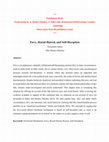
Envy is an unpleasant, culturally vilified and self-threatening emotion that, in many circumstanc... more Envy is an unpleasant, culturally vilified and self-threatening emotion that, in many circumstances, tends to mask itself. In other words, due to various factors, envy often exerts some psychological pressure towards self-deception. A domain where this pressure plays an important and underappreciated role is the political and, more concretely, the realm of racism and identity-based discrimination. Despite historical, empirical, and anecdotal evidence indicating that envy can lead to racial hatred, the link between these two emotions, and the role that self-deception plays in this link, remains under-investigated and poorly understood. This chapter aims at remedying this situation by offering an account of the link between envy and racial hatred. After reviewing the evidence available in support of this emotional link, we elaborate on our account of envy (as presented in Salice and Montes Sánchez 2019). We then explain how, why, and under which circumstances envy can transmute into racial hatred by claiming that this transformation process qualifies as an “emotional mechanism” (Salice and Salmela 2022). We conclude by arguing that the envy-racial hatred emotional mechanism is based on self-deception and, as such, is an immature coping mechanism set in motion by the subject to avoid a negative sense of self.
The paper offers a systematic reconstruction of the relations that, in Husserl's work, bind toget... more The paper offers a systematic reconstruction of the relations that, in Husserl's work, bind together our shared social world ("the spiritual world") with shared intentionality. It is claimed that, by sharing experiences, persons create social reasons and that these reasons impose a normative structure on the social world. Because there are two ways in which persons can share experiences (depending on whether these experiences rest on mutual communication or on group's identity), social normativity comes in two kinds. It is either directed (it has an addressee) or it is collective or absolute (it applies to all group members). Social normativity should be distinguished from axiological normativity: the first is grounded in shared intentionality, the second in values.
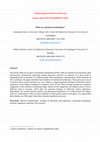
Emotions and Society
The article offers an account of emotional mechanisms (EMs). EMs are claimed to be personal, ofte... more The article offers an account of emotional mechanisms (EMs). EMs are claimed to be personal, often unconscious, distinctively patterned, mental processes whereby an emotion of a given kind is transmuted into an emotion of a different kind. After preliminary considerations about emotions as felt evaluations, the paper identifies three families of emotional mechanisms. These processes are set in motion when a given emotion (e.g., envy, shame, or anger) generates feelings of inferiority and/or impotence in the subject resulting in a negative sense of self. These feelings prompt an evaluative reappraisal of the emotion’s intentional target. Based on the reappraisal, the subject comes to feel a different kind of emotion, which does not generate feelings of inferiority and/or impotence. Importantly, the second emotion entails a psychological disposition to be collectivized: the subject seeks for confirmation of the revised evaluation by sharing the emotion with others. It is argued that these features set EMs apart from other emotion regulatory processes.
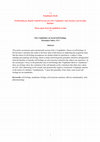
This article reconstructs and systematically assesses Else's Voigtländer's theory of self-feeling... more This article reconstructs and systematically assesses Else's Voigtländer's theory of self-feelings. In the first part, I introduce the reader to the basic ideas of this theory by supporting the exegetical claim that the notion of self-feeling encompasses two distinct kinds of experiences: a subject's longstanding and enduring self-feeling, which is innate and biologically grounded, should be distinguished from the plurality of episodic self-feelings (or self-conscious emotions) this subject can experience. In the second part, I focus on the particular class of self-feelings that Voigtländer labels as "inauthentic:" these are feelings where the evaluation of the self depends on the evaluations that others have about the self. After elaborating on the morally and epistemically negative connotation Voitgländer attaches to the notion of a feeling's "inauthenticity," I reject the generality of her claim: some social selffeelings are not inauthentic.
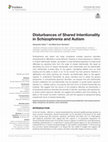
Frontiers in Psychiatry, 2021
Schizophrenia and autism are today considered complex spectrum disorders characterized by difficu... more Schizophrenia and autism are today considered complex spectrum disorders characterized by difficulties in social behavior. Drawing on recent advances in collective or shared intentionality studies, we present a novel theoretical approach to these social difficulties by exploring them from the angle of shared intentionality. We begin by describing two forms of shared intentionality: joint intentionality and we-intentionality. Joint intentionality crucially relies on the agents' mentalizing abilities such as mind reading and the ability to factor in (or "to be moved" by) their partner's intentions in deliberation and action planning. By contrast, we-intentionality relies on the agents' capacity to understand themselves as group members and to adopt the group's perspective. In schizophrenia spectrum disorders, we propose that joint intentionality remains unaffected, but we-intentionality may be impaired. In severe autism spectrum disorder (i.e., infantile autism), we propose that both forms of shared intentionality are impaired. We suggest that the source of the problems affecting we-intentionality in schizophrenia spectrum disorders lies primarily in trait-like, anomalous self-experiences. In severe autism spectrum disorder, we suggest that problems with mind reading, the ability to "be moved" by others' intentions, and with the capacity for perspective-taking impede both forms of shared intentionality.

Topoi
When you and I share an experience, each of us lives through a we-experience. The paper claims th... more When you and I share an experience, each of us lives through a we-experience. The paper claims that we-experiences have unique phenomenality and structure. First, we-experiences’ phenomenality is characterised by the fact that they feel like ours to their subject. This specific phenomenality is contended to derive from the way these experiences self-represent: a we-experience exemplifies us- ness or togetherness because it self-represents as mine qua ours. Second, living through a we-experience together with somebody else is not to have this experience in parallel with the experience of the other. Rather, the paper argues that a we-experience is partly co-constituted by the experience of the other. After offering an account of the phenomenality and constitution of we-experiences, which traces these two elements back to the subject’s self-understanding as a group member, the paper argues for the claim that an experience’s for-us-ness is committal to this experience being co-constituted by another we- experience.
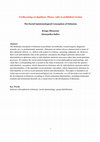
Synthese
The dominant conception of delusion in psychiatry (in textbooks, research papers, diagnostic manu... more The dominant conception of delusion in psychiatry (in textbooks, research papers, diagnostic manuals, etc.) is predominantly epistemic. Delusions are almost always characterized in terms of their epistemic defects, i.e., defects with respect to evidence, reasoning, judgment, etc. However, there is an individualistic bias in the epistemic conception; the alleged epistemic defects and abnormalities in delusions relate to individualistic epistemic processes rather than social epistemic processes. We endorse the social epistemological turn in recent philosophical epistemology, and claim that a corresponding turn is needed in the study of delusions. It is a turn from the (purely) individualistic conception, which characterizes delusions only by individualistic epistemic defects and abnormalities, to the (partially) social epistemic conception, which characterizes delusions by individualistic as well as social epistemic defects and abnormalities. This paper is intended as an initial step toward such a social epistemological turn. In particular, we will develop a new model of the development of delusions according to which testimonial abnormalities, including testimonial isolation and testimonial discount, are a causal factor in the development of delusions.

Phenomenology and the Cognitive Sciences, 2020
In a recent paper, Thomas Szanto (Phenomenology and the Cognitive Sciences, 2019) develops an acc... more In a recent paper, Thomas Szanto (Phenomenology and the Cognitive Sciences, 2019) develops an account of hatred, according to which the target of this attitude, paradigmatically, is a representative of a group or a class. On this account, hatred overgeneralises its target, has a blurred affective focus, is co-constituted by an outgroup/ingroup distinction, and is accompanied by a commitment for the subject to stick to the hostile attitude. While this description captures an important form of hatred, this paper claims that it doesn't do justice to the paradigmatic cases of this attitude. The paper puts forward a "singularist" view of hatred, the core idea of which is that, in its simpler form, hatred is to aversively target the other qua this individual person, where the adverb "aversively" expresses the subject's desire for the target to be annihilated. The conclusion develops some general considerations on the distinction between paradigmatic and marginal instances of an attitude by highlighting its importance for the study of affective phenomena.
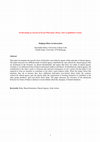
Journal of Social Philosophy
This paper investigates the specific form of help that is provided by agents within episodes of s... more This paper investigates the specific form of help that is provided by agents within episodes of shared agency. The paper discusses two different kinds of shared agency (distributively and collectively shared agency) that are prominent in the literature on shared intentionality and argues that these two kinds of shared agency correlate to two different forms of help in interaction (indirect and direct). In distributively shared agency, the contribution to the other’s goal is a foreseen and expected consequence of one’s action, but the helper is not required to form an intention to contribute to the other’s goal (indirect help). When the helper forms that intention, they do so because they have additional motivation (two-factors direct help). By contrast, collectively shared agency puts the agents under the requirement of forming intentions to contribute to the other group members’ goal (one-factor direct help). The paper discusses the relevance of the distinction between two forms of help in relation to recent debates about the ontogeny of shared intentions.
Emotion Review
This paper explores self-esteem as an episodic self-conscious emotion. Episodic self-esteem is fi... more This paper explores self-esteem as an episodic self-conscious emotion. Episodic self-esteem is first distinguished from self-esteem in the sense of an enduring state related to the subject's sense of self-worth. It is further compared with pride by claiming that the two attitudes differ in crucial respects. Importantly, episodic self-esteem--but not pride--is a function of social esteem: in episodic self-esteem, the subject evaluates herself in the same way in which others evaluate her. Furthermore, social esteem elicits episodic self-esteem if the values at the basis of the others' evaluation are shared by the subject. Such sharing of values suggests that only the evaluations of those others that the subject frames as her in-group members are relevant to episodic self-esteem.
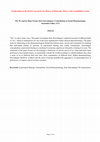
British Journal for the History of Philosophy
“We” is said in many ways. This paper investigates Kurt Stavenhagen’s neglected account of differ... more “We” is said in many ways. This paper investigates Kurt Stavenhagen’s neglected account of different kinds of “we,” which is maintained to be one of the most sophisticated within classical phenomenology. The paper starts by elaborating on the phenomenological distinction between mass, society and community by claiming that individuals partake in episodes of experiential sharing only within communities. Stavenhagen conceptualises experiential sharing as a meshing of conscious experiences infused by a feeling of us-ness. The remainder of the paper focuses on Stavenhagen’s distinction of various senses of us: when individual share preferences, have mutual respect, or emotionally evaluate the world according to a cultural tradition, they elicit a sense of us of different kind and, thus, form communities of different kind. Within phenomenology, Stavenhagen should be credited with the merit of having unearthed the aggregative, we-generating force of preferences, of respect, and of (certain) emotions.
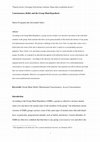
Synthese
According to the Group Mind Hypothesis, a group can have beliefs over and above the beliefs of th... more According to the Group Mind Hypothesis, a group can have beliefs over and above the beliefs of the individual members of the group. Some maintain that there can be group mentality of this kind in the absence of any group-level phenomenal consciousness. We present a challenge to the latter view. First, we argue that a state is not a belief unless the owner of the state is disposed to access the state’s content in a corresponding conscious judgment. Thus, if there is no such thing as group consciousness, then we cannot literally ascribe beliefs to groups. Secondly, we respond to an objection that appeals to the distinction between ‘access consciousness’ and ‘phenomenal consciousness’. According to the objection, the notion of consciousness appealed to in our argument must be access consciousness, whereas our argument is only effective if it is about phenomenal consciousness. In response, we question both parts of the objection. Our argument can still be effective provided there are reasons to believe a system or creature cannot have access consciousness if it lacks phenomenal consciousness altogether. Moreover, our argument for the necessary accessibility to consciousness of beliefs does concern phenomenal consciousness.

Within social psychology, group identification refers to a mental process that leads an individua... more Within social psychology, group identification refers to a mental process that leads an individual to conceive of herself as a group member. This phenomenon has recently attracted a great deal of attention in the debate about shared agency. In this debate, group identification is appealing to many because it appears to explain important forms of intentionally shared actions in a cognitively unsophisticated way. This paper argues that, unless important issues about group identification are not illuminated, the heuristic function ascribed to this notion for an understanding of shared agency remains dubious at best and unfulfilled at worst. This paper offers such a clarification by distinguishing and describing two different mental processes that constitute group identification: adoption of the group perspective and transformation in self-understanding. It is claimed that the latter process consists in the production of what Ruth Millikan labels “Pushmi-Pullyu Representations” and that it is developmentally prior with respect to the ability of adopting the group perspective.











Uploads
Papers by Alessandro Salice
This paper seeks to illuminate this dilemma by analyzing how self and others relate in shame and what kind of self-knowledge can we gain from experiencing this emotion. Our central examples are not cases of individual, but of shame based on group identification. Is shame equally appropriate, and does it have the same significance, when it is group-based?
We argue that shame based on group identification comes in three different varieties. While their conditions of appropriateness are peculiar, their intentional structure and moral significance remains unchanged when compared to individual shame. In particular, group-based forms of shame can reveal the importance of certain others for our social identities, as well as warn us about the ease with which we can come to be influenced by such others. Shame, in its various forms, may pull us in moral and immoral directions, but it is anyway part of the sensibilities that make us moral. In the best cases, it allows us to understand how we stand in relation to our values, to the social world and its expectations of us.
This paper seeks to illuminate this dilemma by analyzing how self and others relate in shame and what kind of self-knowledge can we gain from experiencing this emotion. Our central examples are not cases of individual, but of shame based on group identification. Is shame equally appropriate, and does it have the same significance, when it is group-based?
We argue that shame based on group identification comes in three different varieties. While their conditions of appropriateness are peculiar, their intentional structure and moral significance remains unchanged when compared to individual shame. In particular, group-based forms of shame can reveal the importance of certain others for our social identities, as well as warn us about the ease with which we can come to be influenced by such others. Shame, in its various forms, may pull us in moral and immoral directions, but it is anyway part of the sensibilities that make us moral. In the best cases, it allows us to understand how we stand in relation to our values, to the social world and its expectations of us.
The relation between self-knowledge and human emotions is an often emphasized, but poorly articulated one. While philosophers of emotion tend to give affectivity a central role in making us who we are, the philosophical literature on self-knowledge focuses overwhelmingly on cognitive states and does not give a special place to the emotions. Currently there is little dia- logue between both fields or with other philosophical traditions that have important contributions to make to this topic, such as phenomenology and Asian philosophy. This volume brings together philosophers from the rele- vant fields to explore two related sets of questions: First, do philosophers of emotion exaggerate the importance of our affective lives in making us who we are? Or is it philosophers of self-knowledge who misunderstand emo- tions? Second, what is the role of emotions in self-knowledge? What sort of self-knowledge can be secured by paying attention to our emotions?
Emotional Self-Knowledge is an essential resource for researchers and advanced students working on philosophy of emotion, philosophy of mind, epistemology, philosophical psychology, and phenomenology.
Some of the most original insights provided by what has also been characterized as “early phenomenology” concern the notion of intentionality, which is the property of some mental states whereby they are directed towards objects and states of affairs. Several members of the Munich and Göttingen circles claimed that there are radically different kinds of intentionality (and, by extension, of intentional acts), which cannot be reduced to a unitary genus. Moreover, these authors fostered our understanding of various forms of intersubjective intentionality by developing insightful theories about social or speech acts, empathy, and collective intentionality.
Early phenomenologists understood the investigation of mental experiences as part of a general theory of objects or ontology, and their contributions share some common traits on this matter. In particular, it was assumed that objects and facts exist independently of anyone’s beliefs, mental states or conceptual schemes, and that they instantiate essential properties. The two main categories of phenomenological ontology, to which several members of both circles devoted extensive research, are that of objects and states of affairs.
Some of the most original insights provided by what has also been characterized as “early phenomenology” concern the notion of intentionality, i.e., the feature of some mental states by means of which they are directed to objects and states of affairs. Several members of the Munich and Göttingen circles claimed that there are radically different kinds of intentional acts and states, which cannot be reduced to a unitary genus. For instance, it was argued that the act of perceiving a state of affairs and the act of meaning it with a linguistic expression are not of the same genus and that both acts are further distinct from informing someone about this state of affairs or from enjoying it. Moreover, some of these authors maintained that all these acts or experiences assume different shapes if they are performed by an individual or by a collective subject.
Early phenomenologists understood the investigation of mental experiences as part of a general theory of objects or ontology, and their contributions thereto share some common traits. In particular, it was usually assumed that objects and facts exist independently of anyone’s beliefs, mental states or conceptual schemes and that they instantiate essential properties. The two main categories of phenomenological ontology, to which several members of both circles devoted extensive research, are that of objects and states of affairs.
The 12th Biennial Collective Intentionality Conference
July 13–25, 2020, University of Neuchâtel, Switzerland
Online Conference
Every year, the social ontology and collective intentionality conferences have been wonderful and productive opportunities for us to get together, talk with one another, discuss new work, and push forward this exciting and growing area of philosophy. This year, the current state of the pandemic makes it impossible for us to have the meeting in person. We’d been greatly looking forward to seeing you all in Neuchâtel, and are disappointed not to be able to have the conference in person.
This conference administered by the University of Neuchatel is being held online from July 13-25.
https://so2020.isosonline.org